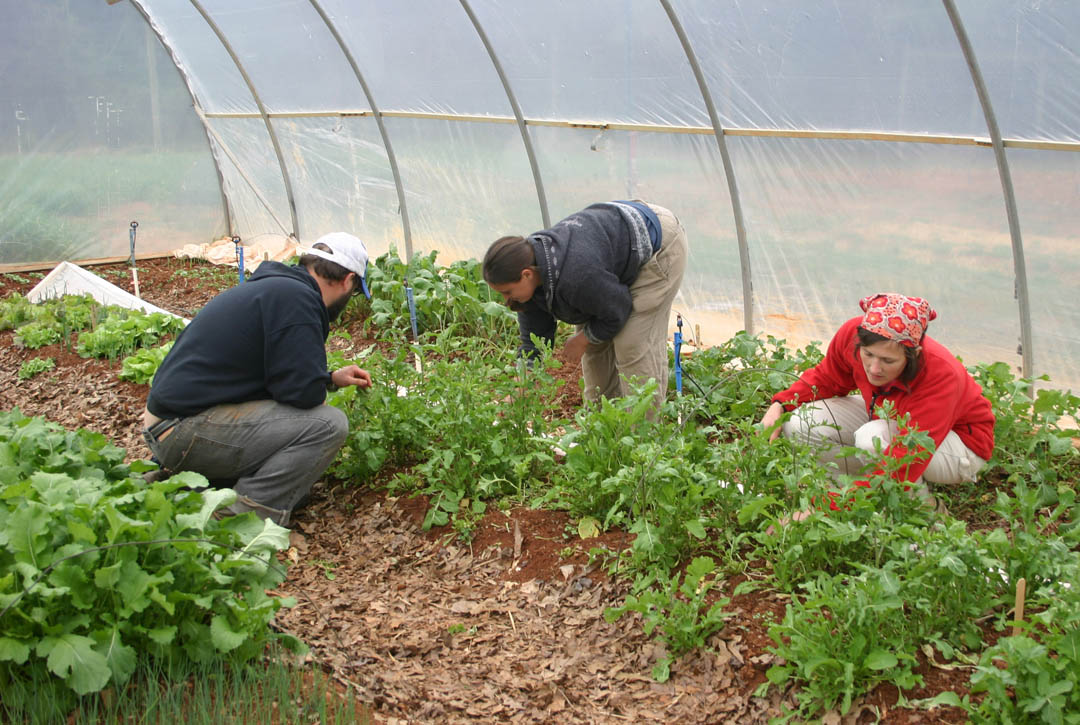| THE FOLLOWING LECTURE ON SRIMAD-BHAGAVATAM, CANTO 3, CHAPTER 24, THE RENUNCIATION OF KARDAMA MUNI, TEXT 43, WAS GIVEN BY HIS HOLINESS BHAKTI CARU SWAMI IN ISKCON UJJAIN ON 11th SEPTEMPER 2010. Transcription : Her Grace Ranga Radhika Dasi Editing : Ramananda Raya Dasa Audio reference: click here After transcribing the lecture below for several hours [...] 
The mystical power of the holy name of Krishna to pacify the agitated mind is expressed poignantly in the Mukunda Mala Stotra (32) as "the capacity to torment the tormentors of the mind." When we strive to live virtuously, we often find our minds tormented by various ungodly forces that instigate us toward vice. Resisting and rejecting these tormenting forces often seems to be an uphill task, if not a losing battle. However, if we fervently chant, attentively hear and prayerfully remember the holy name, then we can turn the tables on those mental tormentors, for the holy name will unleash its irresistible power to torment and drive them away. Therefore, whenever our minds start getting tormented by unholy desires, let us see those desires not as burdens that signal another upcoming internal struggle, but as opportunities that herald new experiences of the magical power of the holy name. 
Srimad Bhagavatam 1.4.1 - Devotees need to learn spiritual culture to avoid the offense of "maryādā-vyatikrama, or impertinently surpassing a greater personality" (SB 3.4.26 purp).
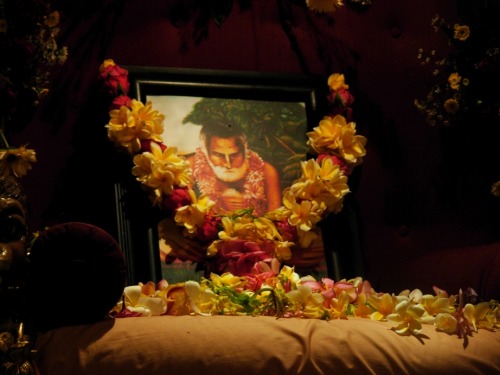
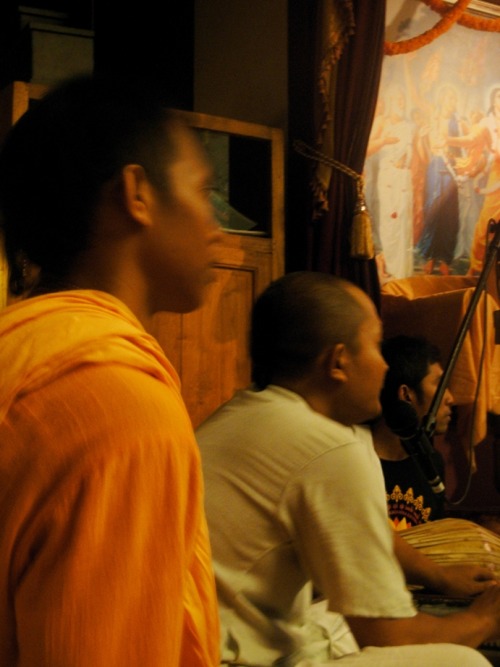
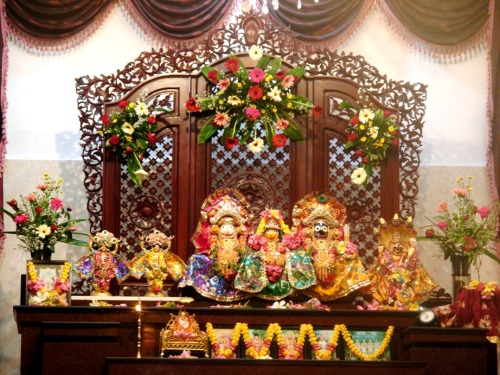
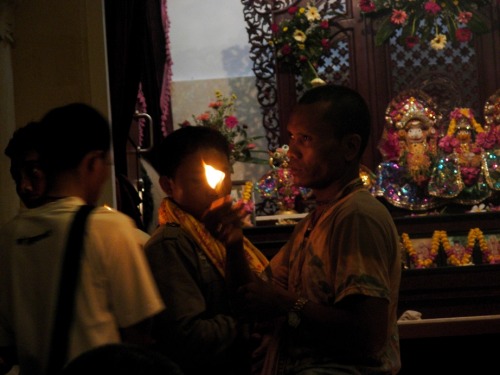
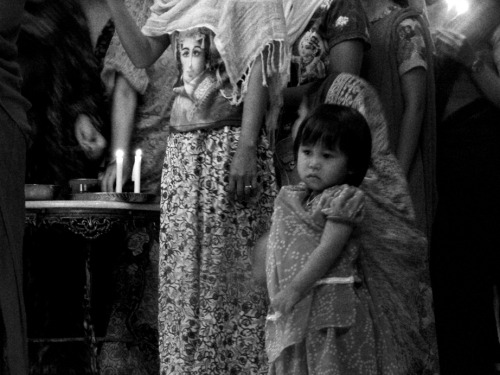
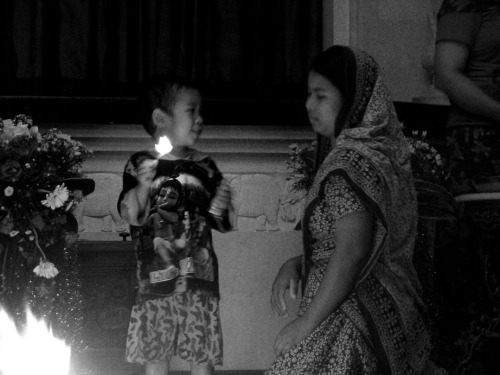
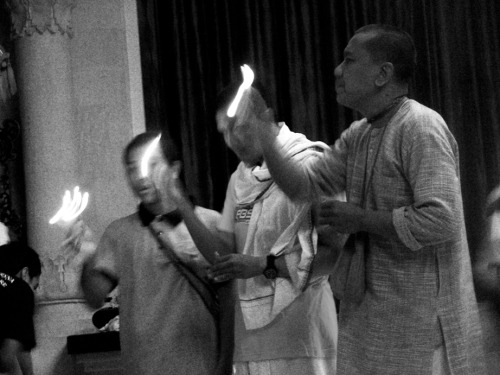
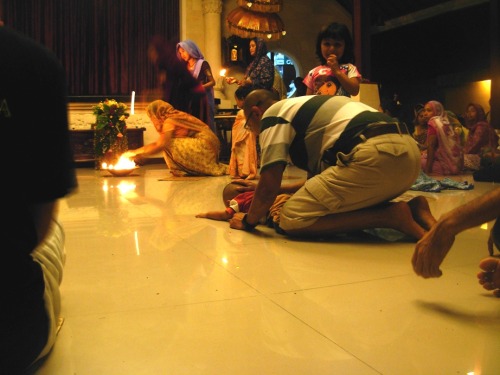
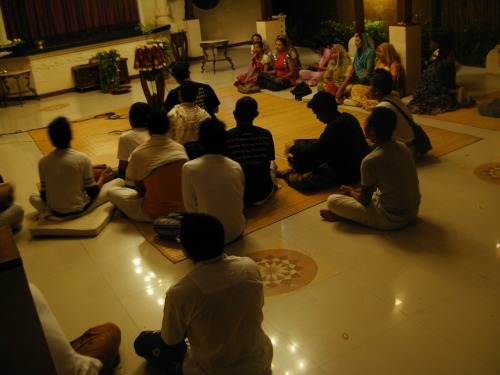
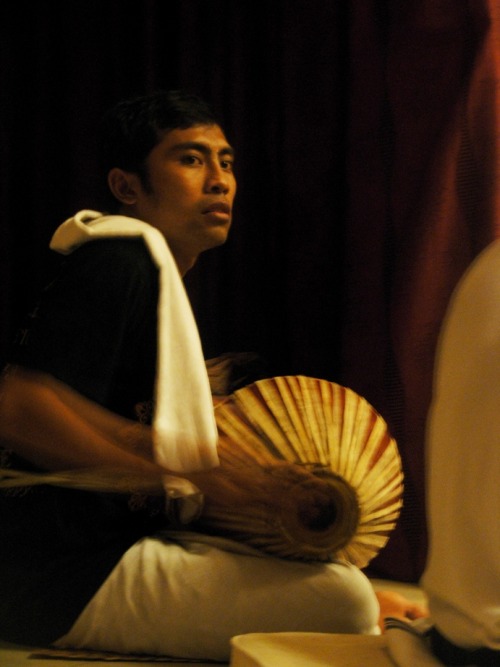
Gaura Kisora Das Babaji Ki Jay!!!
(Kadamba Kanana Swami, June 2011)  We saw how easily Bhisma Dev gave up the royal throne, just because of that fisherman! That ruthless, jealous, cold blooded, bargaining fisherman who wanted his son on the throne. We saw how easily Bhisma Dev gave up the royal throne, just because of that fisherman! That ruthless, jealous, cold blooded, bargaining fisherman who wanted his son on the throne.
Bhisma Dev said: "Okay, no problem". It wasn't even like: "Well, you know……….well this is very painful, what you are asking here". No, there was nothing in his heart like that. It wasn't painful for him to give up the throne. And that was not just a throne, since that was like unlimited opulence….inconceivable opulence. But he was not interested. Therefore, Bhisma Dev was thoroughly free from the enjoying propensities. He was thoroughly free from the material energy, and had no desire to be in this world. Whilst he was here, he was simply serving Krishna. That was his meditation. Not only was Bhisma not just desiring to be in this world and enjoy the material energy, Bhisma Dev was also not desiring to get out of this material world. He also did not think about liberation as his meditation! One mood is the mood to enjoy, and the other mood is: "Oh god, this world is too much! It's just a world of frustration; it's a world of pain; it's a world of suffering; it's a world of misery. We got to get out of here, if we can do anything to get out of here, and out of this world!" That meditation was also not Bhisma Dev's daily or constant meditation. His meditation simply was: "Let me serve Krishna!" So that is vaisnava. Bhisma Dev was beyond karma and beyond jñānī. He was on the level of: 'sarvopādhi-vinirmuktaṁ tat-paratvena nirmalam', [Cc. Madhya 19.170]. As mentioned in the 'Pancaratras', he was only interested in satisfying the senses of Krishna! 
(Kadamba Kanana Swami, June 2011)  Bhisma Dev was deep in his wisdom. He deeply understood the nature of the material world. Therefore Bhisma Dev was not attached. He was not attached to royal opulence. Bhisma Dev would say things like: Bhisma Dev was deep in his wisdom. He deeply understood the nature of the material world. Therefore Bhisma Dev was not attached. He was not attached to royal opulence. Bhisma Dev would say things like:
"I have been purchased by the wealth of Duryodhana". That was not a fact. Others maybe – yes. Others may have joined him because Duryodhana made them offers. This whole battle of Kuruksetra had different warriors who would take sides, and not only out of ideological reasons. No, there were often times when those who came first and proposed good offers: "I'll give you all this?" "Okay, I'm on your side!" A lot was simply based on monetary gain, and Bhisma referred to himself like that. The fact of the matter was that Bhisma was not interested in material enjoyment, and he proved that with his vow. Previously his name was 'Devavratha', which was given to him by birth. The name 'Bhisma' was given to him by a celestial voice, at the time when he made that vow to never get married. Devavratha, the great vowed that impossible vow of celibacy. When he made that vow, the demigods showered flowers upon him, and there was a celestial voice calling out: "Bhisma – the terrible vow! He's taking the terrible vow!" So one cannot take that terrible vow, and simultaneously on another level be inclined towards enjoying the material energy, because then celibacy becomes impossible! One must give up the enjoying propensity. One must thoroughly give it up, if one actually wants to give up sex life, because otherwise, many types of enjoying mentality locks us in a train of emotions and thoughts, in the train of thinking feeling and willing, which will ultimately end in the final station called 'sex'. And the train halts here and all passengers are meant to leave the train and: "Don't forget to take your belongings and get off here!" That is the nature of the mind!   
People Know Sam
Wasaga Beach, Ontario
Everyone in Wasaga seems to know Sam. The manager at the local hotel, the gas station attendant, people at the beach and even I know Sam, for that matter.
Sam runs a boxing studio near the beach in this modest size city of 16,000. He was as a young adolescent growing in Fiji a body builder and got in rigorous training for all of his growing years. Something that paid off. "It kept me out of trouble" he once told me. At 69 he still teaches boxing and he doesn't look his age.
On the wall at his studio on Dunkerron Street. He has his students commit to reciting the tagged on quotes from the Gita- quotes that emulate the qualities of a priestly warrior.
"Peacefulness, self-control, austerity, cleanliness, tolerance, honesty, knowledge, wisdom and religiousness, heroism, power, determination, resourceful, courageous, generous and ability to lead."
Beyond reciting the above the students hear from Sam about curbing fowl language, smoking, and drinking. Sam gets real happy when he sees their commitment and the transformation. Sam himself is a staunch applicant of not only martial arts but of bhakti yoga, the lifestyle of surrender to Krishna. He has a large mural of Krishna and his brother Balaram engaged in stick fighting and a second one with Krishna fist-fighting the notorious opponent Kamsa.
I've known Sam since the seventies when he became a student of bhakti yoga master, Srila Prabhupada. It was good to see him and his wife, Bhismaka, who was the guru's cook in the last months before he passed away. I enjoyed the invigorating walk with Sam aka Vishnu Tattva on the beach which goes on forever, so it seems.
It was a snap decision in the late morning to drive up to Georgian Bay to see them after delivering a talk on the topic of "balance." Sam, by the way, leads that perfect balanced life of levelling spirit and material.
8 KM 
Attitudes Changed
Markham, Ontario
"Holy Cow!" remarked the guy as he passed by. It confirmed for me that the North Americans can be rather extro-verted and uninhibited about expressing something when they see something different, namely me, a monk.
I've been called "Love Guru", "Grasshopper" (a martial arts character) and numerous other things by passersby, mostly compliments, from people on the street. It's mostly young people who volunteer names. When travelling the world you find most people to be reserved although it doesn't mean there isn't judgemental thoughts milling through people's minds.
Opinions have changed over the years with subsequent remarks so I've seen since I was a young brahmacari who joined the order in the spring of '73. We, the Hare Krishnas, were a curiosity at that time, a residual spill-over from the liberal sixties. By the mid-seventies we were viewed with suspicion by the public, mainly hyped by the media. The Ontario government commissioned an inquiry in the early eighties into surging faiths, (cults as we were called then) and with the Dan Nill Report groups like us became more or less liberated from sinister opinion. With so many immigrants coming into Canada, a feel for multi-culturalism and a firm alliance with the Hindu community we succeeded in gaining acceptance from the public.
It was no longer "cool" to call someone a cult member just because he/she belonged to a minority. The world was shaping into a mosaic form and we, the Hare Krishnas, were part of it. I recall battles involving the Human Rights. We were perceived as antagonists, but those were truly just not well informed people.
As of late people have become more cautions about what they say and if they speak spontaneously it is with enhanced respect. Malicious remarks have been on the decline since I've hit the streets. It's a kind of victory over unhealthy prejudices.
In Markham a community which epitomizes multi-culturalism, I attended a home program, a sat-sang, where everyone feels more or less in a safe environment. Of course the highlight feature was the kirtan, chanting.
10 Km 
A Rather Regular Day
Toronto, Ontario
I had not the chance in the morning for a brisk walk due to plane travel from Columbus. When you get home after being absent even for two or three days, and avalanche of tasks descend on your lap. Happily there are the usual emails from hopeful communicators. There are issues to discuss with ashram dwellers and with people who come to do volunteer services. I had two sibling sisters who came for a surprise visit which I was really charmed about. It meant I had to delay walking. How important is it to prioritize?
I don't mind being swamped or being under some pressure as long as Krishna is centre stage and as long as I can get a breather now and then. Then I accomplished for the day as the sun began to sink. The weather was near-freezing. I went out in my thick hemp robes. One man who was placing these deep red dogwood branches in a municipal planter stopped and wanted to know, "How about when it's real winter?"
"I'll wear a coat."
"How about long-johns?" he queried.
"I'll do that too. We have to be practical and use our brains."
He went on to say, "Yeah, we have to use the gifts we've been given."
"Thanks for being concerned," I said, no sarcasm intended.
I proceeded on, walking a steady pace to keep warm, I walked the brain as well, thinking that the human gift is to be introspective, spiritual. "We must follow our nature," is the message of the Gita in chapter Four.
When I returned to the temple/ashram (my home) I was handed a slip of paper with a quote from Einstein:
"Everyone is a genius, but if you judge a fish on its ability to climb a tree, it will live its whole life believing it is stupid."
6 Km 
Raghavendra Swami was a follower of Sripad Madhvacarya and lived from 1595 until 1671. Indu Yenage Govinda is a much-loved song that he sang shortly before he passed away. It is in the Kannada language of Karnataka. The song is a lament for time on earth wasted in material life. Expressions such as this are just as common as exultant songs of praise to Krishna. They are based upon the very real feeling, as death approaches, that: ‘I could have done more. I was given a precious chance to achieve perfection but I wasted my time.’ Raghavendra Swami’s leaving the world was extraordinary in that he simply walked into his own samadhi tomb and assumed the lotus position. Many years later, during the time of the British Raj in India, the local district collector, Sir Thomas Manroe, came to the small village of Mantralayam and visited the tomb. His purpose, however, was not devotional. In 1812 the East India Company had passed a rule that when a temple or shrine had no living owner, the property would be seized by the government. By 1820 the tomb and accompanying temple of Raghavendra Swami had no owner and the British official had come to arrange for its transfer of ownership. “Where is the Swami?” asked Sir Thomas Manroe to the villagers, and the locals pointed him to the tomb. He took off his shoes and entered the structure. As the villagers and priests gathered around they saw a curious sight. The British government man was speaking to someone inside the tomb. They could see him asking questions but no-one could hear the replies. After some minutes the gentleman came out and with a smile said: “Well, that all seems to be in order. I’ve had a charming conversation with the Swami who speaks excellent English by the way, and he assures me that he is the owner of this place.” Some weeks later, Sir Thomas was promoted to governor of Bellary and was therefore in the extraordinary position of officially approving his own account of the story. He came to understand that Raghavendra Swami had indeed passed on 150 years previously, but also knew that he’d had a conversation with him that day and noticed that: ‘His face was glowing…’ There are many such miraculous stories of Raghavendra Swami, but here is a rough translation of the song and two film versions of it, one old and another more recent: Oh Lord Govinda, Mukunda, Lord of Indira (Lakshmi) please show me your lotus feet today. Oh one with a beautiful face, son of Nanda, personification of bliss, who lifted the Mandara mountain, Lord of Indira… I got engulfed in worldly bondage and suffered a lot. I did not see the way ahead, and despaired in the world. Oh Krishna, divine father, please consider me your child and do not count my shortcomings. Oh Hari, out of sheer ignorance I led the life of a coward and did not show deep, strong devotion. I did not see you. I did not sing your glory. Oh charioteer Krishna, I beseech you. During my lifetime I was a mere burden on the world. I lost my way and became like wicked people. There is nobody to protect me now. It all depends on you. Oh brave Venugopal, please help me cross over this world of repeated deaths and births.  
       
NorthHaven, Me.
WhenBrenna Chase was farming in Connecticut a few years back, new farmersweren't always welcome by oldsters. The pie, she says, just wasn'tbig enough. "But now," she said to me here, where she now farms,"the feeling is that the pie is getting bigger and that the morepeople that get into this the better it will be for everyone."
By"this," she means sustainable farming (here I use the terminterchangeably with "organic" because many ethical farmers can'tafford organic certification), and the poised 33-year-old, who beganfarming in high school, is representative of young people I've metall over the country.
These are people whose concern for theenvironment led to a desire to grow — and eat — better food. Andalthough chefs still get more attention, the new farmers deserverecognition for their bold and often creative directions.
RuralMaine, it would seem to almost all of us from "away" as they saydown east, is as unlikely a place to find new farmers as exists inthe lower 48: it boasts harsh, dark winters; a short, cool growingseason; acidic soil; and a transportation "system" that makesshipping both in and out of state a challenge. (Even people havetrouble getting out, as I discovered Monday. And Tuesday.)
There'sonly a quarter as much land in farming in Maine as there was 100years ago, but that's changing. There are more farms today (uparound 50 percent since 1992), more acres in farms and more moneygenerated by farming than there were 20 years ago. This is, at leastin part, thanks to people like Ms. Chase, who follow in the footsteps(foodsteps?) of one of the granddaddies of can-do, intensive organicfarming, Eliot Coleman.
Mr.Coleman runs FourSeason Farm inHarborside with his wife, the gardening writer Barbara Damrosch, andhas squarely faced nearly every challenge a new farmer can since hestarted in 1968. Now, the 1.5 acres he cultivates, mostly invegetables, are not only almost unimaginably lush (Ms.Damrosch's gorgeousflowers don'thurt), but they're so productive that, in his cheerful, wise way,Mr. Coleman almost gloats: "You couldn't be in a less likely spotthan here to do what we're doing," he says, "and yet we'vetransformed a poor, wooded area into a place where there's nothingwe can't grow." I marvel at his artichokes; he responds: "Igrow them just to make the Californians nervous."
Now71, Mr. Coleman maintains his long-range view. (He delights intelling the story about unloading a truckload of free clamshells whena county agent came by. "The agent," says Mr. Coleman, "wasincredulous: 'Those aren't going to break down for 100 years!'But I was thinking, 'I have 100 years of free fertilizer here!'") And he clearly loves the work. ("If work is what you do whenyou're not doing what you want," he quips, "I haven't workeda day in my life.")
Hesells his output locally for about $125,000 a year; most of that paysfor labor. If he scaled up, he reckons, the net income would begreater. This, of course, is the concern of many new farmers: How doyou afford to buy land, hire labor and still make a living? ForMr. Coleman, this isn't so much of an issue. In some circles he'sa hero for his innovative approaches to fertilizing, greenhouses,tool-making, teaching and more. He's probably inspired as manyfarmers as anyone in the Northeast, and his books, especially "TheWinter Harvest Handbook," have taught the art of season-extensionto thousands of gardeners, including me. (His place isn't calledFour Season Farm for nothing, and, remember, this isn't San Diego.)So book sales, speaking engagements and other money-generators forboth him and Ms. Damrosch help out with the income. (This isn'tunusual. Most conventional farmers, even those of commodity crops, dononfarm work to help pay the bills.That's the current state of farming in America.)
Fornewcomers, though, this is precisely the issue because, as Ms. Chasesays, "If you could make a good living farming, people would gointo it and stay in it."
Thesimple answer, of course, is to charge more for food. But can anincreasing number of sustainable farms find markets forhigher-quality, higher-priced produce?
Here,the answers become complicated: "If the cost of food reflected thecost of production," says Ms. Chase, "that would changeeverything." And this is undoubtedly true. But though sustainablyproduced food is too expensive for some, conventional food doesn'treflect either the subsidies required to grow it or the hugeenvironmental or health care costs it incurs. Once it does,sustainable food would appear far more competitive. Thenwe'd see more farmers growing it, not only in Maine but everywhereelse. Which would, indeed, be better for everyone.

This Saturday saw a very colourful and festive wedding. This was the first wedding coordinated by Jess Mataji, our new 'Wedding Co-ordinator'.
Here are some pictures, the majority of which have been taken by Jahnu Best (Mother Urmila's grandson); it was also his first go at events' photography with a professional camera.

Yes! Last Saturday was quite eventful! On that same Saturday, Mother Urmila gave a seminar on 'Parenting in Krsna Consciousness'. Here are a few shots, taken by her grandson again.

"His gunja-berry necklace is sweet, His flower garland is sweet, sweet is the Yamuna river, and sweet are her rippling waves, her water is sweet, and sweet are the lotus flowers also..."
(Madhurastakam) O Yamuna Devi, O sweet devotee of such a sweet Lord, please always grant us His darsana.
You taught the importance of performing one's chanting without inattention. Inattention is counted as one of the aparadhas. Even if one successfully overcomes all the other offenses in chanting, and one is chanting continuously, love of God may not come. One should know that the reason for this is that one is committing the offense known as pramada, or inattention. This offense will block progress to prema.
Chapter 12 - Inattention While Chanting
Harinama Cintamani – Bhaktivinoda Thakura
Bhagavat Purana Das: Hare Krishna Initiation in Vrindavana at Iskcon's Krishna-Balaram Mandir, Kartik, October 29, 2011 |

















